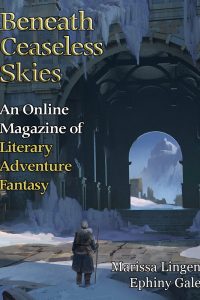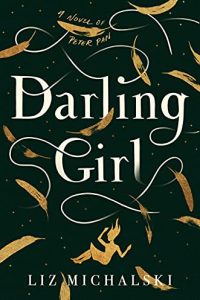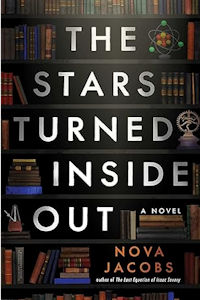Gary K. Wolfe Reviews The Rock Eaters: Stories by Brenda Peynado
 The Rock Eaters: Stories, Brenda Peynado (Penguin 978-0-143135623, $16.00, 288pp, tp) May 2021.
The Rock Eaters: Stories, Brenda Peynado (Penguin 978-0-143135623, $16.00, 288pp, tp) May 2021.
Brenda Peynado’s first collection, The Rock Eaters, places her in that growing cadre of talented short fiction writers who seem equally comfortable in venues as diverse as The Georgia Review and Tor.com, and whose voice is just as distinctive when writing about real-world poverty and student debt or about grim futures in which people take refuge in VR while their bodies vegetate in clean rooms to protect from ravaging plagues on the outside. The latter story, ‘‘The Touches’’, may be the most extreme example of the sort of compromises her characters make to survive in complex and hostile environments, but survival is one of the themes that connect her essentially mainstream stories with more bizarre tales of bodily metamorphosis. Another, closely related theme is marginalization, trying to find a place in a world that seems bent on betraying or even killing you. Sometimes Peynado begins with exaggerated versions of real life, as in ‘‘The Drownings’’, set in a version of Florida in which it’s become accepted that hundreds of young people will drown each year; here the outsider figure is a new girl named Rosa, who doesn’t even know how to swim. In ‘‘Thoughts and Prayers’’, as the title suggests, the theme is school shootings, which have become such a part of daily life (again set in Florida) that organizations with names like Mothers for the Sanctity of the World and Good Guys with Guns move from community to community to stage bizarre right-wing rallies. The outsiders here are a poor Muslim family in a neighborhood of Latino Catholics, but the story shifts fully into the fantastic by introducing pigeon-like ‘‘angels,’’ who sit on houses and supposedly protect the families, but who largely seem to just shit on the roofs.
The malleability or vulnerability of bodies is a recurring theme in Peynado’s fiction, often expressed through some sort of metamorphosis. In ‘‘The Stones of Sorrow Lake’’, stones physically grow onto the bodies of townspeople as an expression of traumatic sorrow, eventually forming huge piles around the shores of the titular lake. In one of a few stories set in real-world dictatorships, ‘‘The Radioactives’’, four young people are assigned to a new high-tech truck developed in the US and offered to the Chavez regime as a way of detecting drug smugglers using an experimental x-ray device, but radiation leaks cause one of them to develop an extra heart, another to grow fantastically long arms, and another to project her dreams into other people’s minds. Conversely, under the dictatorship in ‘‘What We Lost’’, probably the closest thing to a direct political allegory in the book, the citizens literally lose body parts, which may later show up in a field of waving hands or a valley of noses. Almost as allegorical is ‘‘The Rock Eaters’’, which addresses the ambivalence of leaving a troubled homeland for a more hopeful life; in this case, citizens of an unnamed island nation (Peynado identifies as Dominican American) develop the ability to fly away from their homeland, but when they return years later with their kids, the kids take to eating rocks to weigh themselves down, refusing to fly as they seek roots in the old country.
The most direct and best SF story is ‘‘The Kite Maker’’, which was included in Carmen Maria Machado & John Joseph Adams’s 2019 Best American Science Fiction and Fantasy. Dragonfly-like aliens arrive on Earth, fleeing a dying planet. Though innocent and harmless, fascinated by antique mechanical toys and kites, the aliens (themselves dubbed Dragonflies) inevitably become the target of skinhead terrorism and opportunistic politicians; as the narrator says of a school friend, ‘‘before the Dragonflies arrived, she and I would have been hated instead – for our dark hair, her Chicana roots and my Dominican ones, that we knew how to speak Spanish.’’ As emotionally resonant as the tale is, it makes less effective use of the resources of SF than the more rigorously worked-out ‘‘The Touches’’, set in a plague-ridden world so poisonous that people are born and grow up in sealed, sterile environments, attended by bots as they live their lives as avatars in virtual spaces; the striking opening line – ‘‘I’ve been touched exactly four times in real life’’ – sets the chilling tone for one of Peynado’s grimmest tales, and one with distant echoes of Forster’s classic ‘‘The Machine Stops’’. ‘‘The Dreamers’’ is a highly original variation on the Sleeping Beauty theme, set in a world in which people have begun to live entirely without sleep for decades, and sleep itself has become something of a sin, thanks to a dogmatic order of nuns who enforce the notion than any time spent sleeping is deducted from your lifespan. This is particularly a problem for those who do fall asleep, often for years at a time, like the narrator’s boyfriend, who she hopes to wake up with a kiss, as ‘‘in all the stories of lovers liberated from sleep and glass coffins.’’ A similar theme is at the center of ‘‘Catarina’’, whose narrator is in love with a husband whose wife, as the result of a failed brain surgery, is effectively in a coma but is able to utter random words and even play with Legos, though no one is certain if a functioning mind remains.
Gary K. Wolfe is Emeritus Professor of Humanities at Roosevelt University and a reviewer for Locus magazine since 1991. His reviews have been collected in Soundings (BSFA Award 2006; Hugo nominee), Bearings (Hugo nominee 2011), and Sightings (2011), and his Evaporating Genres: Essays on Fantastic Literature (Wesleyan) received the Locus Award in 2012. Earlier books include The Known and the Unknown: The Iconography of Science Fiction (Eaton Award, 1981), Harlan Ellison: The Edge of Forever (with Ellen Weil, 2002), and David Lindsay (1982). For the Library of America, he edited American Science Fiction: Nine Classic Novels of the 1950s in 2012, with a similar set for the 1960s forthcoming. He has received the Pilgrim Award from the Science Fiction Research Association, the Distinguished Scholarship Award from the International Association for the Fantastic in the Arts, and a Special World Fantasy Award for criticism. His 24-lecture series How Great Science Fiction Works appeared from The Great Courses in 2016. He has received six Hugo nominations, two for his reviews collections and four for The Coode Street Podcast, which he has co-hosted with Jonathan Strahan for more than 300 episodes. He lives in Chicago.
This review and more like it in the September 2021 issue of Locus.
 While you are here, please take a moment to support Locus with a one-time or recurring donation. We rely on reader donations to keep the magazine and site going, and would like to keep the site paywall free, but WE NEED YOUR FINANCIAL SUPPORT to continue quality coverage of the science fiction and fantasy field.
While you are here, please take a moment to support Locus with a one-time or recurring donation. We rely on reader donations to keep the magazine and site going, and would like to keep the site paywall free, but WE NEED YOUR FINANCIAL SUPPORT to continue quality coverage of the science fiction and fantasy field.
©Locus Magazine. Copyrighted material may not be republished without permission of LSFF.







